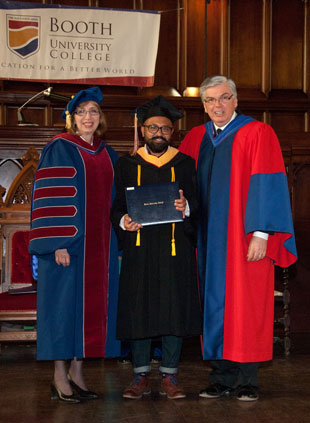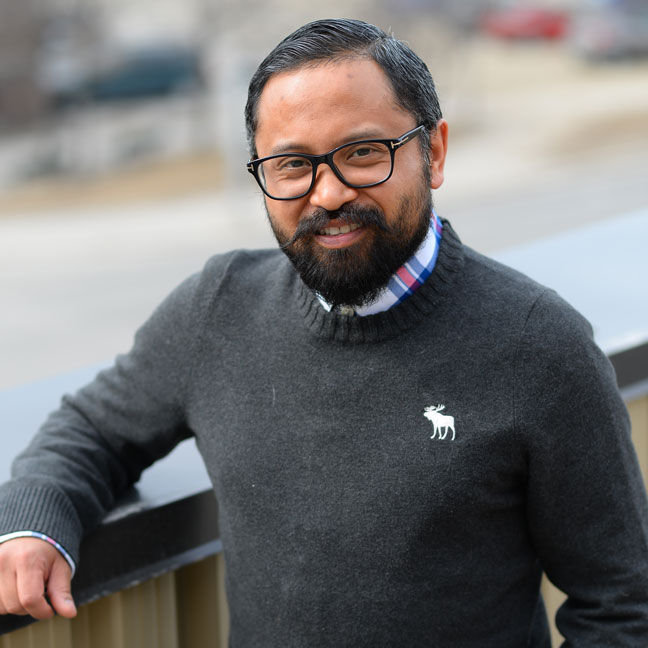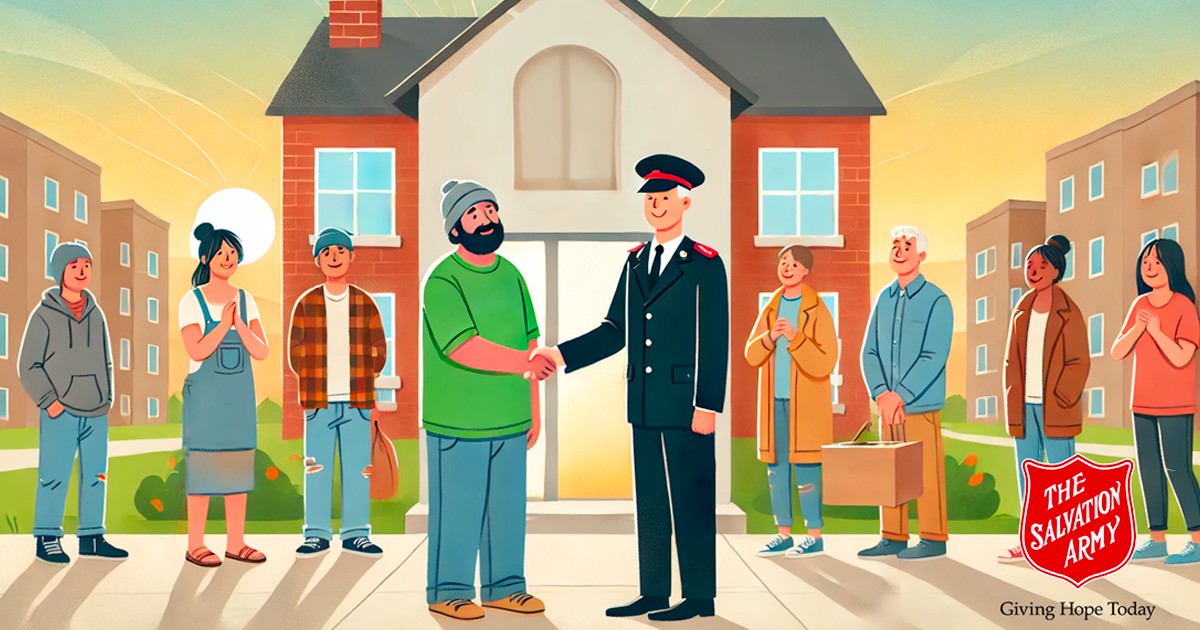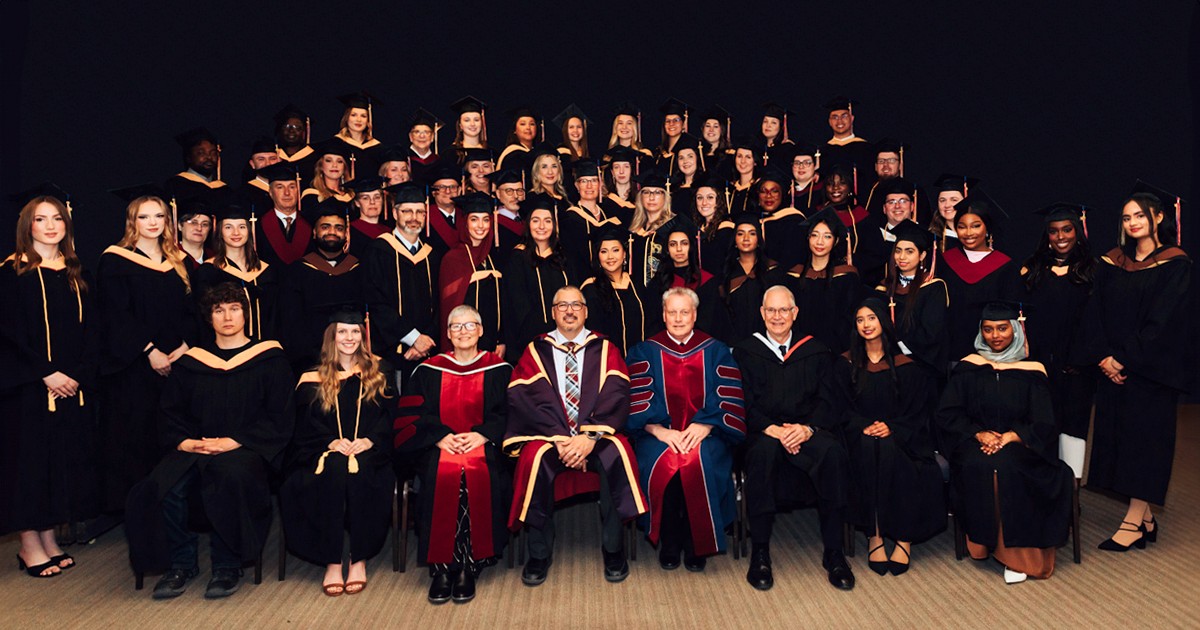With those words echoing in his mind, Capili suddenly felt the weight of his surroundings—the pain in his stomach a symptom of crystal meth withdrawal, the empty apartment a reminder of the rival who had just robbed him of everything he owned.
“That moment when I heard that voice was the single greatest moment of my life,” Capili reflects. “I believe that God was speaking to me. And I didn't deserve that—I did nothing for God to talk to me.”
Wearing only the clothes on his back, Capili got up and left. “I was a crying mess,” he remembers. “I didn't know what I was going to do; I was just wandering the streets.”
Yet as he walked the streets of Winnipeg on that cold December day, eventually making his way to the Addictions Foundation of Manitoba, Capili had an underlying sense of peace.
“Despite coming to this recognition that my life was a terrible mess and that I needed to do something, but didn't know what, I knew it was going to be OK.”
Identity Theft
Born in the Philippines, Capili and his family immigrated to Canada, settling in Winnipeg, when he was a year old. When their qualifications were not recognized in Canada, his parents struggled to provide for their family.
The effects of poverty hit Capili harder as he grew older. “As the youngest of six kids, I wore hand-me-downs—sometimes they were from my sisters so I would go to school in girls' clothes,” he remembers. “I was trying to form an identity and kept getting rejected everywhere I went. I was really lonely.”
In high school, Capili started skipping class to avoid being bullied and went to an arcade where he found a place among other misfits. “This was a group of people who accepted me,” he says. “We'd go to someone's place and, at first, we were just drinking alcohol, but then it progressed. Over the years that became my identity.”
Capili went to five different high schools before dropping out completely. He took work where he could find it, but rarely held on to a job for long. “When I got money, I didn't know how to handle it so I would go to parties,” he says. “I got into cocaine, acid, ecstasy and eventually crystal meth.” From the moment he tried meth at the age of 25, he was completely addicted.
On the Run
The next 10 years of Capili's life were a drug-fuelled blur. As his addictions grew stronger, Capili stole and committed fraud to support his habits. “I would use my older brother's resumé to get jobs,” he shares. “I had no idea what I was doing but it didn't matter because, at the time, I was making what felt like a huge amount of money.”
Making a larger sum of money, Capili was able to buy larger quantities of drugs and sell them to others, often ripping them off. His addiction to crystal meth hit its peak when Capili, now 32, began using intravenously.
“Shooting it up took things to the next level,” he says. “I went from hanging out with people like me, who had a drug addiction but were trying to function in life, to hanging out with hardened criminals and sex workers. I became part of the city's underworld.”
Capili was employed at the time—the last job he held before he went into recovery. “I convinced my employer to co-sign for a car,” he says. “Then when I got the new car, I went into my place of employment, stole a bunch of laptops, and never went back.”
After stealing from his employer, Capili went off the grid. “I was on the run for three years, living in my car or squatting in apartments,” he says. “Being transient is a terrible lifestyle. I was always thinking that someone I ripped off was going to beat me up, or the police would find me.”
“I was on the run for three years, living in my car or squatting in apartments”
By the time Capili went to rehab, he was living in constant fear. “When my girlfriend's former boyfriend got out of jail, he terrorized us,” he says. “When we could afford it, we'd stay in hotels and not tell anyone where we were. But he would find us and break the window to get in and steal our drugs.”
When he arrived at the Addictions Foundation of Manitoba, Capili was assessed and told that a bed would be ready for him in a week or so.
“I slept in the street, but every morning I went to the Addictions Foundation of Manitoba and sat there and prayed,” he remembers. “I never did the whole praying thing, but I sat there and asked God to give me a bed. Three days later, I got that bed.”
Back to School
Once settled in the facility, Capili asked for a Bible, which he had never read before. “I still have that Bible,” he says with a smile. “It's a giant print edition, made for seniors, but I loved it.”
He found a church through a friend he met at AA, became a Christian and was baptized. By the end of 2011, he had completed the 12 steps.
“That first year was amazing—it was probably the best year of my life,” Capili reflects. “I was in a space where I could recreate myself, where I could say, 'I'm not a drug addict anymore. I can change the trajectory of my life.' ”
Capili completed his high-school education and initially wanted to be a pastor. “But then I realized that I would be in a Christian circle the majority of the time,” he says. “I thought there are people out there, who aren't Christians, that I can make a bigger impact on their lives, and social work would provide that avenue and those opportunities.”
Looking for a reputable social work program, Capili found his way to Booth University College. “Thinking about high school and being at big schools, I didn't want that experience again,” he says. “Booth was small, faith-based and close to where I was living.
“All my failure and hurt—I can actually do something with that, and now I have the skills from Booth to help people”
“University was a really scary thing for me,” he continues. “I was successful in AA because I was aware that I was shy and I intentionally made friends with people. So I did the same thing with Booth in my first year. I was eager to meet people who would support me—to make these genuine friends that I had wanted my whole life—and I did.”
Capili thrived at Booth and had the grades to match, but hit a rough patch early in his third year.
“I put a lot of expectations on myself,” he admits. “I took an extra course one semester and I couldn't handle it. I had to drop a class and I felt terrible.”
He was at the point of giving up, and thought he might relapse, when he turned to his Booth professors for support.
“My favourite professor was Andrew Eason,” he says. “While taking his intro to Christianity class, I was talking to him about my life and being scared about school, and he said I had what it takes to get through it. He is such a good guy, really smart and fair, and a great professor. I respected him and for someone I respect to say that about me meant a whole lot. He mentored me without even knowing it.
“If I went to a big school, I'd probably be afraid of going up to the staff and talking to them, but at Booth, they have this supportive culture,” he continues. “They believed in me, they saw something in me and they knew my story. I always felt like they were rooting for me and wanted me to succeed.”
The Skills to Help
In his third year at Booth, Capili also met his future wife, Megan, whom he married at the end of the academic year.
“She really helped me through that year,” he shares. “I was seriously thinking about dropping out and had I not met this woman, I may have.”
 Ben Capili receives the Chancellor's Award from Commissioner Susan McMillan, territorial commander, and Dr. Donald Burke, president of Booth University College, at the convocation ceremony in April
Ben Capili receives the Chancellor's Award from Commissioner Susan McMillan, territorial commander, and Dr. Donald Burke, president of Booth University College, at the convocation ceremony in April
As he and Megan wrapped up their final year at Booth together, Capili hoped to be class valedictorian—not for himself, but for his parents.
“I wanted to publicly thank them for putting up with me, raising me and sacrificing for me, but I lost out on that opportunity because I didn't win the valedictorian and I was disappointed,” he says.
When Capili arrived at Knox United Church this past April to receive his bachelor of social work, he wasn't expecting anything more than to walk across the stage and collect his degree. Hearing his named called when the Chancellor's Award was announced was a complete surprise.
“I was in shock,” he recalls. “It wasn't until the end of that night when I was crying that it hit me that I had won this award.
“It was one of those moments where I could look back on my whole life and see that Christ was there the whole time,” he continues. “All my failure and hurt—I can actually do something with that, and now I have the skills from Booth to help people.”
Since April, Capili and his wife have relocated to Kitchener, Ont., where both will be studying for a master's degree in social work at Wilfrid Laurier University. This summer, Capili has been working at a homeless shelter.
“I know the language, the thinking and the pitfalls of the people I serve and I have the skills and education to articulate that, to empower, engage and equip them,” he says. “I wouldn't have that without my wife, without Booth and without Christ.”










Leave a Comment